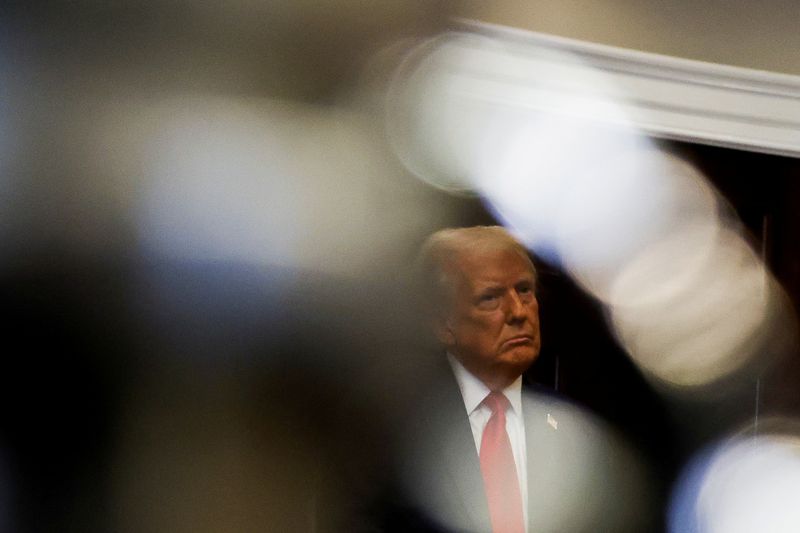Morning Bid: Trump switches to AI as tariffs lurk, Netflix soars
2025.01.22 06:21
A look at the day ahead in U.S. and global markets from Mike Dolan
Retaining a persistent, if uncertain, threat of new tariffs, U.S. President Donald Trump quickly switched his attention to technology and artificial intelligence this week – exciting the red-hot sector that’s about to report its latest earnings round.
Trump on Tuesday announced a private sector investment of up to $500 billion to fund infrastructure for artificial intelligence, aiming to outpace rival nations in the business-critical technology.
The newly sworn-in President said ChatGPT creator OpenAI, SoftBank (TYO:) and Oracle (NYSE:) plan a joint venture called Stargate, which he said will build data centers and create more than 100,000 jobs in the United States.
Softbank (OTC:) shares soared more than 10% in Tokyo trading, while Oracle surged 9% out of hours ahead of Wednesday’s bell.
With the fizz back in tech, streaming giant Netflix (NASDAQ:) burst 14% higher in premarket trade on Wednesday after its latest earnings update revealed a record 18.9 million new subscribers over the holiday quarter and plans for price hikes.
The renewed tech focus comes as the Nasdaq has marginally underperformed the broader so far this year, with even Apple (NASDAQ:) under a cloud on Tuesday despite brisk Wall Street stock index gains. The Apple retreat allowed AI-chip darling Nvidia (NASDAQ:) to retake top spot as America’s most valuable company.
With some big industrial names topping the corporate diary on Wednesday, and the first 10% of S&P500 firms pointing to overall annual profit growth of almost 11% through the last quarter, stock futures were up smartly before the open.
The S&P500 closed above the 6,000 mark on Tuesday for the first time this year – less than 1% from record highs.
Despite the AI tilt, Trump continued to rattle the tariff sabre overnight – without necessarily giving much additional clarity on where exactly or when they may be coming.
Trump vowed to hit the “very, very bad” European Union with tariffs and said his administration was also discussing a 10% punitive duty on Chinese imports – blaming the trafficking of fentanyl from China to the U.S. via Mexico and Canada.
Currency gyrations around the threats seemed to have calmed down, however, with traders adopting a ‘wait and see’ mode and assuming any moves will happen only after the countries in question respond to Trump’s main concerns.
The slipped to its lowest in two weeks, with the euro clocking its best levels of the year so far – even as European Central Bank officials speaking in Davos lined up behind more interest rate cuts this year.
Even though exchange rate swings have seemed large this week, implied currency volatility gauges have actually subsided. Three-month dollar/yen ‘vol’ fell to its lowest since July on Wednesday with the Bank of Japan’s latest interest rate hike now seen to be baked in. Equivalent euro vol measures are the lowest since November, and even sterling measures have returned to two-week lows.
European shares brushed off Trump’s trade threats too, with the STOXX600 index hitting a record high on Wednesday. Addidas helped to a new record too and the sportswear brand jumped 6% after its latest results.
The near 6% gain in benchmark euro zone stock indexes this year is twice that of the S&P500 in dollar terms – with Bank of America’s latest global fund manager claiming allocations to European stocks this month were their second largest allocation in a quarter of a century.
Chinese stocks were less enthusiastic about being back in the tariff firing line, however, and fell back about 1% on Wednesday – the yuan slipping too.
Despite the pre-inauguration phone call between Trump and Chinese President XI Jinping last week, Trump appears to be emboldened enough to publicly resume the trade war he started in his first term.
Back in fixed income markets, the jittery start to the new year seems to have calmed considerably.
A combination of lower oil prices – due in part to Trump’s plans to increase domestic drilling – and the lack of immediate tariff hikes has helped to cosset Treasury yields back at levels seen at the turn of the year.
After significant relief from U.S. inflation data last week, Canada underlined the optimism on consumer prices on Tuesday with an unexpectedly large drop in monthly prices that kept annual inflation below the Bank of Canada’s 2% target last month.
Elsewhere, recently agitated British gilts also outperformed this week as news of a big drop in UK hiring and robust auction demand for the bonds offset higher public borrowing numbers and pulled yields back to where they were at the start of the year.
Key developments that should provide more direction to U.S. markets later on Tuesday:
* Canada December producer price inflation
* US corporate earnings: Halliburton (NYSE:), Procter & Gamble (NYSE:), Johnson & Johnson (NYSE:), Discover Financial, Kinder Morgan (NYSE:), Steel Dynamics (NASDAQ:), Abbott Laboratories (NYSE:), Travelers (NYSE:), Amphenol (NYSE:), Ge Vernova, TE Connectivity (NYSE:), Textron (NYSE:), Teledyne
* World Economic Forum in Davos, including European Central Bank President Christine Lagarde, Bundesbank President Joachim Nagel, Bank of France chief Francois Villeroy de Galhau, Dutch central bank boss Klaas Knot and European Union commissioner Valdis Dombrovskis

* German Chancellor Olaf Scholz meets French President Emmanuel Macron in Paris
* US Treasury sells $13 billion of 20-year bonds
(By Mike Dolan, editing by William Maclean; mike.dolan@thomsonreuters.com)








